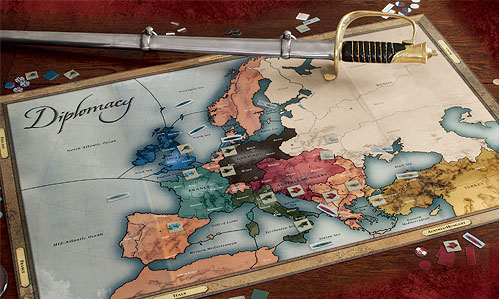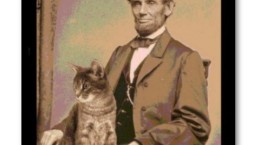 Religion is, and has been, a powerful belief system for about three quarters of the world population. The United States Pledge of Allegiance (which includes the phrase, “under god”) that young kids are taught to memorize and chant in school, is a constant reminder that religion is a huge part of people’s lives. In 2010, The Pew Research reported about 84 percent of the world population was affiliated with a religious group. However, a newer study done in 2013 proposes that the number of religiously affiliated people in the world has declined to 74 percent. Therefore, considering that about three quarters of the world population is still religious, it is quite evident that religion may indirectly play a prominent role in diplomatic initiatives and policies.
Religion is, and has been, a powerful belief system for about three quarters of the world population. The United States Pledge of Allegiance (which includes the phrase, “under god”) that young kids are taught to memorize and chant in school, is a constant reminder that religion is a huge part of people’s lives. In 2010, The Pew Research reported about 84 percent of the world population was affiliated with a religious group. However, a newer study done in 2013 proposes that the number of religiously affiliated people in the world has declined to 74 percent. Therefore, considering that about three quarters of the world population is still religious, it is quite evident that religion may indirectly play a prominent role in diplomatic initiatives and policies.
The tug-of-war between the state and religion is controversial, yet imperative to discuss, especially in that the world is mostly religious. Many may argue that religion has been a driving force for creating a civilized nation. Religion has been used to inspire people and give hope, yet also as an excuse to justify war and hatred. While striping away the religiously associated traditions and stereotypes, all religions advocate generally the same ideals (at least in my opinion), including peace
and love.
Religion has been a hot topic, especially in the era of post 9/11. We do, for the most part, live in religious world. Therefore, it is no surprise that there are religious leaders and communities who demand religious input when making foreign policy decisions.
According to the Deputy Chief of Mission at the U.S. Embassy in Paris, Uzra Zeya, “President Obama and Secretary Kerry have emphasized the importance of engaging religious leaders and communities in advancing development, human rights and conflict mitigation. To this end, the Department is facilitating engagement involving citizens, faith-based organizations, and governments. The Bureau I represent, the Bureau of Democracy, Human Rights and Labor (DRL), is heavily engaged in interfaith collaboration.”
Therefore, it is clear that religious leaders are considered when making foreign relations decisions. However, should religion be considered when handling diplomatic initiatives and foreign policy issues? Some may say yes, and some may say no. There are two sides to this debate.
First of all, most religious leaders and communities would probably want their religious beliefs incorporated in some way “to create a civilized and peaceful society.” On the other hand, some people may want to exclude religious input because they may not be as religious as others and wouldn’t want religious personal opinions to rule the country. These people may favor the separation of church and state.
In addition, effective arguments and decisions should be involving the public, in which everyone agrees and takes part in. According to Gary Gutting, professor of philosophy at the University of Notre Dame, “a religious argument, based on, say, the authority of the Bible or of the Pope, would therefore, be out of place in a public debate among citizens with every variety belief and disbelief.”
When considering religion into the equation, there may be an abundance of different views that come into play, in that there are numerous religions and beliefs that people affiliate with; this may eventually lead to foreign relation issues.
Although religions were originally designed for harmony, they can also indirectly lead to wars. By no means am I advocating that religions cause foreign relation issues. In fact what I’m advocating is that it may not be the religion itself, but rather some individual religious extremists that put a damper on certain religions; thus causing wars and world problems. Hence, religion is a controversial element when considering foreign policies and should be handled wisely in the decision-making process.





Pingback: Buy viagra without a prescription()
Pingback: generic cialis online()
Pingback: buy generic cialis()
Pingback: cost of cialis()
Pingback: Viagra order()
Pingback: Buy branded viagra()
Pingback: cost of cialis()
Pingback: cialis 5mg()
Pingback: cialis 20mg()
Pingback: cialis from india()
Pingback: cheap viagra()
Pingback: cheap viagra()
Pingback: viagra 100mg()
Pingback: buy ed pills online()
Pingback: ed pills()
Pingback: medicine for impotence()
Pingback: best online pharmacy()
Pingback: generic cialis()
Pingback: levitra generic()
Pingback: buy vardenafil online()
Pingback: vardenafil generic()
Pingback: doubleu casino online casino()
Pingback: ocean casino online nj()
Pingback: viagra online prescription()
Pingback: real casino online()
Pingback: pala casino online()
Pingback: instant loans()
Pingback: no credit check loans()
Pingback: cash loan()
Pingback: cialis 20()
Pingback: best real money casinos()
Pingback: real money online casinos()
Pingback: free slots online()
Pingback: online casinos for usa players()
Pingback: cialis to buy()
Pingback: buy cialis()
Pingback: cialis 5 mg()
Pingback: bingo real money australia()
Pingback: cialis 20()
Pingback: casinos()
Pingback: best online casino for money()
Pingback: online slots()
Pingback: sildenafil generic()
Pingback: viagra from india()
Pingback: generic cialis at walmart()
Pingback: discount viagra online()
Pingback: viagra without prescriptions()
Pingback: cheapest generic viagra()
Pingback: viagra pills 100mg()
Pingback: jueriy.com()
Pingback: Viagra 130mg nz()
Pingback: Viagra 150mg pills()
Pingback: Viagra 150 mg united states()
Pingback: cheap Viagra 120mg()
Pingback: Viagra 130mg price()
Pingback: Cialis 20 mg online pharmacy()
Pingback: Cialis 80mg online()
Pingback: Cialis 80mg over the counter()
Pingback: Cialis 40 mg coupon()
Pingback: where can i buy Cialis 20 mg()
Pingback: Cialis 20 mg coupon()
Pingback: Cialis 20 mg canada()
Pingback: where to buy Cialis 10 mg()
Pingback: Cialis 10mg cost()
Pingback: sildenafil 120mg over the counter()
Pingback: tadalafil 40mg uk()
Pingback: levitra 10 mg canada()
Pingback: lasix 40mg generic()
Pingback: furosemide 100mg no prescription()
Pingback: propecia 5 mg otc()
Pingback: buy lexapro 5mg()
Pingback: buy finasteride 5 mg()
Pingback: abilify 20mg price()
Pingback: actos 15mg united kingdom()
Pingback: order aldactone 100 mg()
Pingback: where can i buy allegra 120mg()
Pingback: allopurinol 300 mg uk()
Pingback: amaryl 1 mg for sale()
Pingback: amoxicillin 250 mg australia()
Pingback: how to buy ampicillin 250 mg()
Pingback: antabuse 250mg tablets()
Pingback: cialistodo.com()
Pingback: arava 10mg australia()
Pingback: strattera 18 mg price()
Pingback: aricept 5 mg without a prescription()
Pingback: arimidex 1mg online()
Pingback: order tamoxifen 10 mg()
Pingback: ashwagandha 60caps cheap()
Pingback: atarax 25mg australia()
Pingback: augmentin 750/250mg online pharmacy()
Pingback: avapro 300mg nz()
Pingback: avodart 0,5mg medication()
Pingback: baclofen 25 mg online()
Pingback: bactrim 800/160 mg price()
Pingback: where to buy benicar 20 mg()
Pingback: order Biaxin 500 mg()
Pingback: cheap Premarin 0,625 mg()
Pingback: calcium carbonate 500 mg usa()
Pingback: cardizem 60mg otc()
Pingback: where can i buy casodex 50 mg()
Pingback: catapres 100mcg price()
Pingback: ceclor 500 mg canada()
Pingback: ceftin without a doctor prescription()
Pingback: celebrex over the counter()
Pingback: celexa 10mg purchase()
Pingback: how to purchase cephalexin 500 mg()
Pingback: cipro 500mg generic()
Pingback: casino games()
Pingback: direct car insurance quotes()
Pingback: quick payday loans near me()
Pingback: installment loans()
Pingback: quick loans colorado()
Pingback: online payday loans()
Pingback: hemp cbd oil side effects()
Pingback: cbd oil for sale online()
Pingback: best full spectrum cbd oil()
Pingback: cbd oil discount coupons()
Pingback: benefits of cbd hemp oil()
Pingback: assignment of leases()
Pingback: Order viagra usa()
Pingback: buy an essay paper()
Pingback: cleocin coupon()
Pingback: Viagra overnight()
Pingback: clomid 25mg uk()
Pingback: clonidine 0,1mg tablet()
Pingback: clozaril 25mg no prescription()
Pingback: Order viagra usa()
Pingback: colchicine cheap()
Pingback: symbicort inhaler 160/4,5mcg usa()
Pingback: combivent 50/20mcg usa()
Pingback: coreg 25mg united kingdom()
Pingback: compazine no prescription()
Pingback: coumadin usa()
Pingback: cozaar 25mg usa()
Pingback: Real viagra pharmacy prescription()
Pingback: crestor 20 mg nz()
Pingback: Buy generic viagra online()
Pingback: where to buy dapsone 1000caps()
Pingback: ddavp 10 mcg pharmacy()
Pingback: differin nz()
Pingback: diltiazem united states()
Pingback: where to buy doxycycline()
Pingback: dramamine cheap()
Pingback: order elavil 10mg()
Pingback: erythromycin 500mg tablet()
Pingback: etodolac 300 mg australia()
Pingback: flonase nasal spray without a doctor prescription()
Pingback: garcinia cambogia caps no prescription()
Pingback: how to buy hyzaar()
Pingback: imdur usa()
Pingback: imitrex tablet()
Pingback: imodium 2 mg without prescription()
Pingback: blog link()
Pingback: imuran no prescription()
Pingback: indocin 25mg tablet()
Pingback: lamisil 250mg purchase()
Pingback: lopid without a doctor prescription()
Pingback: lopressor online pharmacy()
Pingback: luvox no prescription()
Pingback: macrobid without a prescription()
Pingback: meclizine without prescription()
Pingback: mestinon 60mg without a doctor prescription()
Pingback: mobic 7,5 mg price()
Pingback: motrin 400 mg online()
Pingback: nortriptyline 25 mg cheap()
Pingback: periactin without a doctor prescription()
Pingback: where can i buy phenergan()
Pingback: plaquenil without a doctor prescription()
Pingback: prednisolone 5mg cost()
Pingback: where to buy prevacid 15 mg()
Pingback: cost of prilosec()
Pingback: proscar 5 mg online()
Pingback: where can i buy protonix()
Pingback: provigil 200 mg over the counter()
Pingback: pyridium 200 mg online()
Pingback: retin-a cream 0.025% australia()
Pingback: revatio online()
Pingback: cheap seroquel 300mg()
Pingback: order singulair()
Pingback: skelaxin 400mg prices()
Pingback: spiriva 9 mcg for sale()
Pingback: tenormin 25mg medication()
Pingback: toprol online pharmacy()
Pingback: how to buy valtrex()
Pingback: vantin 100 mg australia()
Pingback: voltaren pills()
Pingback: cost of zithromax 100mg()
Pingback: this hyperlink()
Pingback: zovirax tablet()
Pingback: zyprexa online pharmacy()
Pingback: zyvox united states()
Pingback: sildenafil without prescription()
Pingback: how to buy tadalafil 60 mg()
Pingback: order furosemide()
Pingback: escitalopram 10 mg canada()
Pingback: buy aripiprazole 10mg()
Pingback: fexofenadine 120 mg for sale()
Pingback: leflunomide prices()
Pingback: atomoxetine 10 mg coupon()
Pingback: anastrozole without a doctor prescription()
Pingback: irbesartan otc()
Pingback: dutasteride price()
Pingback: olmesartan united states()
Pingback: buspirone cost()
Pingback: clonidinemg for sale()
Pingback: cefuroxime 250 mg usa()
Pingback: where to buy celecoxib 200 mg()
Pingback: citalopram 10mg cheap()
Pingback: ciprofloxacin 250 mg medication()
Pingback: clindamycin price()
Pingback: clozapine 25 mg usa()
Pingback: prochlorperazine 5mg prices()
Pingback: carvedilol cheap()
Pingback: warfarin tablets()
Pingback: rosuvastatin purchase()
Pingback: where can i buy divalproex()
Pingback: trazodone no prescription()
Pingback: how to purchase fluconazole 150mg()
Pingback: bisacodyl 5mg over the counter()
Pingback: order venlafaxine()
Pingback: amitriptyline medication()
Pingback: permethrin 30g canada()
Pingback: cost of erythromycin 500 mg()
Pingback: 141generic2Exare()
Pingback: inegqbjj()
Pingback: estradiol 1 mg online()
Pingback: fluticasone 50mcg otc()
Pingback: how to buy alendronate()
Pingback: wat is beter viagra of cialis()
Pingback: how to use topical ivermectin()
Pingback: glipizide australia()
Pingback: hydrochlorothiazide 10mg over the counter()
Pingback: isosorbide for sale()
Pingback: cheap loperamide()
Pingback: viagra cialis o levitra()
Pingback: azathioprine 50 mg no prescription()
Pingback: cheap propranolol()
Pingback: indomethacin online pharmacy()
Pingback: lamotrigine 25 mg united kingdom()
Pingback: buy terbinafine()
Pingback: levofloxacin 750mg usa()
Pingback: how to purchase levothyroxine mcg()
Pingback: augmentin 800()
Pingback: lasix online purchase()
Pingback: zithromax 600()
Pingback: ivermectin pills()
Pingback: albuterol prescription online()
Pingback: gemfibrozil usa()
Pingback: how to buy metoprolol()
Pingback: clotrimazole uk()
Pingback: doxycycline uti dose()
Pingback: prednisolone 5mg tablets()
Pingback: clomid and iui()
Pingback: alcohol with priligy()
Pingback: diflucan drug interaction()
Pingback: synthroid grapefruit()
Pingback: 5mg propecia()
Pingback: neurontin recall()
Pingback: alternatives to metformin()
Pingback: paxil and adderall()
Pingback: plaquenil skin cancer()
Pingback: retin a canada pharmacy no prescription()
Pingback: tinder auto liker 2017()
Pingback: 20 mg cost()
Pingback: plaquenil hydroxychloroquine who manufactures()
Pingback: hydroxychloroquine dosage for sarcoptic mange()
Pingback: hydroxychloroquine 200mg prices()
Pingback: dosing hydroxychloroquine for covid()
Pingback: ivermectil by mail in us()
Pingback: contraindications for priligy()
Pingback: buy stromectol online overnight shipping()
Pingback: will stromectol treat uti()
Pingback: deltasone potassium()
Pingback: ivermect()
Pingback: stromectol online purchase()
Pingback: stromectol e coli()
Pingback: how does ivermectin work scabies()
Pingback: generic ivermectin()
Pingback: generic amoxil 500 mg()
Pingback: lasix 20 mg cost()
Pingback: neurontin pill()
Pingback: plaquenil cost uk()
Pingback: prednisone pharmacy()
Pingback: dapoxetine canada()
Pingback: provigil 400 mg()
Pingback: ivermectin()
Pingback: where to buy ventolin()
Pingback: azithromycin price()
Pingback: lasix sale()
Pingback: where can i buy viagra over the counter in singapore()
Pingback: prednisone 25g()
Pingback: modafinil 200()
Pingback: ivermectin malaria()
Pingback: combivent generic()
Pingback: stromectol coronavirus()
Pingback: nolvadex canada()
Pingback: buy latisse()
Pingback: buy clomid cheap()
Pingback: zanaflex otc()
Pingback: monulpiravir()
Pingback: Anonymous()
Pingback: zanaflex 4()
Pingback: Anonymous()
Pingback: Anonymous()
Pingback: is ivermectin safe for humans()
Pingback: stromectol tablets()
Pingback: ivermectin in india()
Pingback: ignition casino safe()
Pingback: ivermectin australia()
Pingback: ivermectin cost()
Pingback: buy prednisone 40mg for sale()
Pingback: what is tadalafil()
Pingback: buy tadalafil online()
Pingback: ivermectin 24 mg()
Pingback: stromectol tab()
Pingback: where can i order generic viagra()
Pingback: can i buy generic cialis()
Pingback: us pharmacy generic viagra()
Pingback: ivermectin india()
Pingback: where can i get cialis over the counter()
Pingback: generic tadalafil 20mg india()
Pingback: online cheap tadalafil()
Pingback: viagra or cialis()
Pingback: sildenafil pills prescription()
Pingback: price for cialis()
Pingback: stromectol for humans()
Pingback: sildenafil tablets()
Pingback: buy cialis online()
Pingback: sildenafil tadalafil()
Pingback: peptide tadalafil()
Pingback: prednisone 20mg for 7 days()
Pingback: prednisone 20mg per day()
Pingback: antiviral medicament()
Pingback: buy generic cialis()
Pingback: where to purchase cialis in canada()
Pingback: ivermectin 50()
Pingback: side effects of prednisone in humans()
Pingback: viagra precio()
Pingback: tadalafil otc()
Pingback: win real cash online casino()
Pingback: cheap tadalafil()
Pingback: india ivermectin()
Pingback: ivermectin()
Pingback: buy doxycycline online australia()
Pingback: zone free online casino games()
Pingback: cheap cialis india()
Pingback: prescription generic viagra()
Pingback: buy viagra online()
Pingback: ivermectin powder()
Pingback: best price on ivermectin pills()
Pingback: how much does ivermectin cost()
Pingback: ivermectin tablets uk()
Pingback: ivermectin 0.5 lotion india()
Pingback: ivermectin 12mg otc()
Pingback: buy cialis online in india()
Pingback: buy ivermectin 3mg tablets()
Pingback: ivermectin 12mg otc()
Pingback: stromectol medicine()
Pingback: ivermectin 6mg for sale()
Pingback: buy ivermectin from india()
Pingback: madridbet()
Pingback: meritking()
Pingback: meritking()
Pingback: drug furosemide()
Pingback: meritroyalbet()
Pingback: ielexusbet()
Pingback: trcasino()
Pingback: furosemide 200 mg tab()
Pingback: eurocasino()
Pingback: ivermectin ivermectinst()
Pingback: meritroyalbet()
Pingback: molnupiravir and ivermectin()
Pingback: eurocasino()
Pingback: eurocasino()
Pingback: where to buy ivermectin uk()
Pingback: ivermectin and india()
Pingback: ivermectin 4 tablets price()
Pingback: ivermectin uses()
Pingback: how to use cialis()
Pingback: madridbet()
Pingback: luckylandslots.com login()
Pingback: stromectol 15 mg()
Pingback: hydroxychloroquine without prescription()
Pingback: ivermectin cream uk()
Pingback: ivermectin nahdi()
Pingback: walmart cost for cialis()
Pingback: stromectol uk buy()
Pingback: ivermectin withdrawal time()
Pingback: child porn()
Pingback: stromectol nz()
Pingback: cialis over the counter at walmart()
Pingback: ivermectin uk()
Pingback: hydroxychloroquine used to treat()
Pingback: meritking()
Pingback: child porn()
Pingback: grandpashabet()
Pingback: meritking()
Pingback: izmir escort()
Pingback: fuck google()
Pingback: child porn()
Pingback: child porn()
Pingback: fuck google()
Pingback: porn()
Pingback: porn()
Pingback: Can sperm be stolen vardenafil hcl 20mg?()
Pingback: Medications and Women's Health - Empowering Choices for Well-being viagra pill womens?()
Pingback: What are the effects of chronic use of anabolic steroids on erectile function in young men levitra website?()
Pingback: How are digital health applications and medical apps regulated to ensure safety best place and site to buy dapoxetine in us?()
Pingback: Precision Nutrition - Eating for Your Genes levitra cheap?()
Pingback: Personalized Medicine - A Revolution in Healthcare Azithromycin tablet?()
Pingback: Medications and Bone Health - Strong Foundations for Well-being hydroxychloroquine sulfate 200mg prices?()
Pingback: sex()
Pingback: What are three causes of weak sperm order Cenforce generic?()
Pingback: What happens to your body if you don't move all day Cenforce 100mg online?()
Pingback: What makes a man to release quick buy Cenforce sale?()
Pingback: Who's responsible for quality Cenforce over the counter benefits?()
Pingback: Oral Immunotherapy - Revolutionizing Food Allergy Treatment zithromax antibiotic?()
Pingback: porn()
Pingback: Medications and Alzheimer's Disease - Preserving Cognitive Function buy vidalista online?()
Pingback: Emerging Trends in Precision Medicine and Targeted Therapies Zithromax tri pak?()
Pingback: Innovations in Assisted Reproductive Technology vidalista black 80 vs super kamagra?()
Pingback: The Intersection of Medicine and Technology - Advancing Health Care Solutions order kamagra?()
Pingback: New Breakthrough in Drug Research Promises Hope for Patients fildena online order?()
Pingback: The Future of Health Care - Exploring Innovative Drug Therapies buy Cenforce 50mg without preion?()
Pingback: What feelings do men hide cheapest levitra?()
Pingback: çeşme transfer()
Pingback: How can I find I am in love vidalista?()
Pingback: How can I turn my wife on in the mood vidalista 60 y edegra 100 mg?()
Pingback: What OTC medications are available for excessive gas relief buy dapoxetine priligy?()
Pingback: What should you not take with antibiotics Buy stromectol and ivermectin 3mg lowest price, bonus pills?()
Pingback: What are the three main factors that determine quality buy Cenforce 100mg pills()
Pingback: What is the newest inhaler for asthma is ventolin a laba med()
Pingback: Why are men bigger kamagra where does come from when ordered()
Pingback: albuterol 90mcg inhaler()
Pingback: Cenforce 100 dosage()
Pingback: Are eggs high in zinc??()
Pingback: What to text him to get him back??()
Pingback: hd porno izle()
Pingback: izmir travesti()
Pingback: priligy dapoxetine review - Which is the best gift for husband?()
Pingback: flagyl 500 mg online pharmacy()
Pingback: sikiş()
Pingback: furosemide 100mg pill()
Pingback: buy ventolin inhaler()
Pingback: yasam ayavefe()
Pingback: buy lasix 40mg generic()
Pingback: albuterol sulfate inhalation solution()
Pingback: centurion laboratories vidalista 40()
Pingback: trt cream()
Pingback: testosterone gel 1.62()
Pingback: testosterone hormone gel()
Pingback: proair hfa 90 mcg inhaler()
Pingback: proair coupon()
Pingback: vilitra brand name()
Pingback: proair inhaler()
Pingback: metronidazole 500 mg tablet()
Pingback: coupon levitra()
Pingback: testoheal()
Pingback: 1 androgel()
Pingback: hydroxychloroquine sulfate()
Pingback: grandpashabet()
Pingback: grandpashabet()
Pingback: What are serious side effects of antibiotics hydroxychloroquine plaquenil?()
Pingback: oral ivermectin for rosacea()
Pingback: dapoxetine 30()
Pingback: cenforce professional()
Pingback: fildena 120mg()
Pingback: bu site sitemap tarafından güncellenmiştir()
Pingback: vidalista 60 y edegra 100 mg()
Pingback: cheap generic viagra french kamagra()
Pingback: vidalista 40()
Pingback: porn()
Pingback: clomid 50mg()
Pingback: child porn()
Pingback: furosemide 20 mg for sale()
Pingback: Buy cheap cialis()
Pingback: plaquenil 200mg()
Pingback: vardenafil tablets()
Pingback: Nolvadex for pct()
Pingback: vidalista 40 dosage()
Pingback: buy Cenforce 50mg pill()
Pingback: is this vidalista black 80mg good?()
Pingback: how to buy dapoxetine online()
Pingback: vidalista 10 tablets()
Pingback: clomid off brand()
Pingback: child porn()
Pingback: clomid cost()
Pingback: vidalista user reviews()
Pingback: vidalista biverkningar()
Pingback: clomid 50mg()
Pingback: clomid pct for sale()
Pingback: clomiphene citrate 50 mg for men()
Pingback: clomiphene 50mg tablets()
Pingback: priligy pills()
Pingback: buy priligy()
Pingback: buy kamagra 100mg online()
Pingback: vidalista 10 mg for sale()
Pingback: vidalista kopen nederland()
Pingback: vidalista tadalafil 10mg()
Pingback: betgross giriş()
Pingback: lugabet giriş()
Pingback: advair diskus cost()
Pingback: ajanta kamagra oral jelly 100mg()
Pingback: cenforce 200 mg india()
Pingback: cenforce 100()
Pingback: purchase Cenforce without prescription()
Pingback: child porn()
Pingback: buy cenforce 200 online()
Pingback: child porn()
Pingback: jojobet()
Pingback: ivermectin pour on for dogs()
Pingback: jojobet twitter()
Pingback: buy priligy()
Pingback: sildenafil 100mg tablet()
Pingback: fildena forum()
Pingback: fildena 100mg()
Pingback: what is vidalista()
Pingback: child porn()
Pingback: fildena 100 mg amazon()
Pingback: child porn()
Pingback: Cenforce()
Pingback: warnings for tadalafil()
Pingback: levitra coupon()
Pingback: animal porn()
Pingback: cenforce 25()
Pingback: vidalista 20 reviews()
Pingback: buying kamagra online()
Pingback: Sildenafil Citrate 20 mg Cost()
Pingback: kamagra vs cialis()
Pingback: cost sildenafil 50mg()
Pingback: spinco()
Pingback: ventolin hfa 90 mcg inhaler()
Pingback: samsung taşınabilir ssd()
Pingback: kamagra vs cialis()
Pingback: Sildenafil 150 mg()
Pingback: ciprodex good rx()
Pingback: cenforce 200 india()
Pingback: tadalafil tablets prices()
Pingback: kamagra bejing()